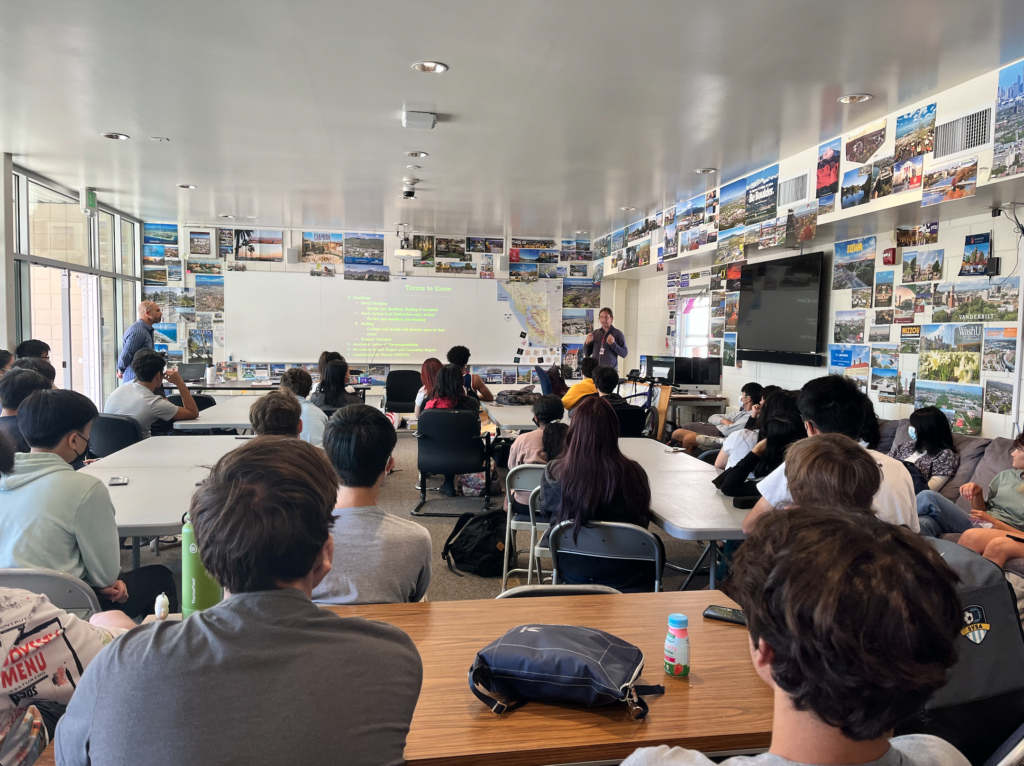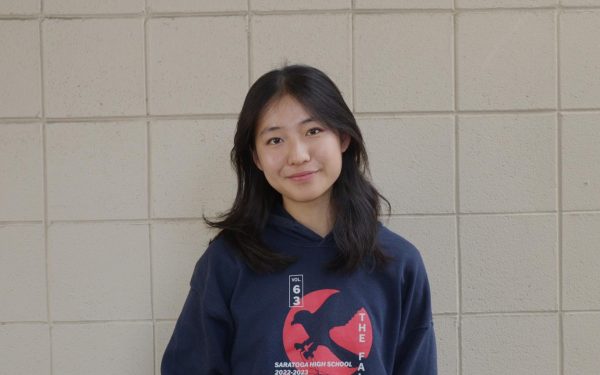Upon returning to school this August, students and teachers alike discovered that a previously deserted room between the music building entrance and cafeteria now sports a brand new look. The open layout reveals couches, tables and most prominently, walls adorned with over one hundred colorful posters displaying colleges spanning the nation — from Montana State University to Yale.
By the first week of school, the space was transformed into the College and Career Center — home to Brad Ward, the school’s new College and Career Specialist. Ward joined the staff this summer, and was offered a choice between the current space and the Zappelli conference room in the office; the open plan and central location of the current College and Career Center made it a more appealing choice. She moved in the week before school started, and has been working on decorating the room ever since.
Ward has worked in the field of college admissions for 23 years. After graduating from Bucknell College in Pennsylvania with a degree in English, she volunteered as an alumni representative for college fairs and held interviews with prospective applicants.
Just before her tenth college reunion in 2000, Ward was offered a full-time position as a regional admissions officer on the West Coast at her alma mater. She went on to work at Bucknell for seven years before joining the Menlo School, a private high school in Atherton, as an in-house college counselor and world religions teacher.
After ten years at Menlo, she served brief stints as a college counselor at Menlo-Atherton High School, Terra Linda High School and South San Francisco High School — all public schools in the San Francisco Bay Area.
“I attended private schools from second grade through high school, college and grad school. That basically was my entire life until four years ago, when the Menlo Atherton public school opportunity opened up and I was like, ‘that’s a blind spot,’” Ward said. “I needed to know what public education is like, considering 90% of students in this country attend public schools.”
Although Menlo-Atherton and Terra Linda high schools are both affluent public schools with similar demographics to Saratoga, Ward also served for two years as a college counselor at South San Francisco High School, a primarily Hispanic school which has a 95% minority enrollment with nearly 40% of students eligible for free or reduced lunches.
Ward made a “purposeful shift” to work at a school which she observed had many low income, ESL, undocumented and first-generation minority students who would not normally have access to the college admissions resources that students from wealthier schools would have.
Working at South San Francisco opened her eyes to glaring inequities in the college admissions process, where affluent students most often have a leg up over those without resources. As a result, Ward is committed to using her skills and experience as a college counselor to help students bridge the gap. Ward has a wealth of experience as both a counselor and an admissions officer under her belt, having personally visited over 300 college campuses around the country — but she provides free services which many other private counselors often charge thousands for.
However, when the Saratoga-Los Gatos Union School district posted a listing for a college counselor this summer, Ward decided to apply for it, despite having planned to continue at South San Francisco for at least another year. The new position offered better pay, better visibility as a transgender college counselor, and was closer to home, so she took on the job. Ward’s position is district-funded, which means that the school’s budget was not directly impacted by her addition to the staff.
“At this stage of my career, I would find it really, really difficult to return to a private school because of all the privilege, wealth and inequity they represent. But Saratoga is comparable with private schools in terms of the privilege here, so I felt hypocritical about it,” Ward said. “It was a torturous decision because I knew that I left behind a lot of students who need, in many cases, way more help. However, I am the only transgender college counselor in this whole country, as far as I know, and I need the national visibility that a district like Saratoga can provide for people like me.”
Ward has continued to help her replacement in San Francisco with the transition and continues to see some of her students for private counseling, free of charge. However, her biggest efforts since the school year started have been to settle into her position at Saratoga’s new College and Career Center. Ward makes a point to attend back-to-school events such as parent information nights, the Back-to-School Social and Falcon Fest to introduce herself to the community and ensure that parents and students are aware of her services.
This is the first time the school has had a dedicated college admissions specialist position for individual counseling, according to principal Greg Louie. In previous years, duties were shared by the school’s guidance counselors as well as administrator Geetha Ramanathan, who handled college workshops and testing last year. With Ward taking on college counseling duties exclusively, the administrative burden on guidance counselors is reduced and a new source of support is provided for students.
“Having someone dedicated to advising students on college and career options is a fantastic resource for our students, and truly a gift,” Louie said. “We want our students to feel supported in making these important decisions.”
Ward’s work with students mainly takes place in the form of one-on-one meetings and a few general workshops scattered throughout the year. During the fall semester, she calls every senior for at least one individual meeting — whether they want to continue counseling with her is at their discretion. In the introductory meeting, Ward learns more about the student’s personality and preferences so they can begin to put together a list of prospective colleges to apply to.
While building lists, she examines factors such as desired majors, regional preferences, politics, campus and class size, campus type (urban, suburban or rural), religion, racial diversity, political leanings and finances.
“When she’s on vacation, she makes a point to visit a college in whatever town she’s visiting to find different options for our students,” said guidance counselor Brian Safine, who works closely with Ward. “So that really speaks to dedication.”
While many students want to go to difficult, name-brand schools such as Berkeley, Stanford and the Ivies, Ward said she tries to bring attention to larger public universities, or “safety schools” with higher acceptance rates in order to create balance in their college lists. Additionally, she strives to destigmatize community college as a genuine option rather than a backup or last resort, having seen many students thrive in colleges they never expected to even apply to. Especially at SHS, where getting into a “good college” is the “end-all-be-all,” Ward urges students to rethink what the qualifications for a “good college” are.
“Something I know from experience is that sometimes, students end up attending a college which they had never even heard of before senior year, and end up loving it,” Ward said. “They can’t imagine their life anywhere else — it’s the perfect fit. That’s part of the reason I have so many posters up here — to help students broaden their horizons.”
Ward doesn’t just help students with their preliminary college lists — a large part of her job is supporting students with organizing financial aid as they apply to colleges, which can often be a confusing and difficult process. Although the need for financial aid is less pressing in affluent public and private schools, she often had to navigate the process with her students in South San Francisco — many of whom were first generation — noting that money is a taboo subject in many households, regardless of family income.
As a result, students have a difficult time putting together their tax and financial documents in order to apply for aid and need-based scholarships. However, she makes it a priority to ensure that all of her students end up with minimal financial obligations or college loans — even if that means encouraging them to choose a less “prestigious” state school or community college over expensive private schools.
“She makes it part of her life to learn more about colleges for the benefit of our kids,” Safine said. “She hangs out with students after hours when she’s not getting paid for it, and that speaks volumes to us.”
She also tries to be a positive role model for students, through her other interests, such as musical theater, traveling and creating college admissions statistics. Over Labor Day weekend, Ward traveled to Utah — home of the nation’s 43rd highest peak — to train to become the first transgender woman to climb the tallest peak in the country.
In just a few weeks here, Ward has already started fitting into the community. She can be found at football games, drama productions and other events that students have invited her to. Ward said she looks forward to getting to know the SHS community at its core and working with the motivated students.
Ward’s outlook towards college equity has been especially informed by her experiences as a transgender woman, having been through the college admissions process when she presented as a cisgender man. After starting to make her dressing transition, Ward was able to experience, firsthand, the kind of obstacles many minority and queer students face in their everyday lives — obstacles which can often impede their education. Ward has also realized that SHS is a community where she feels comfortable starting her physical transition with both hormones and top surgery, which she began over the Labor Day weekend. Ward said, because of her identity, she prefers to be addressed by just her first name “Brad,” saying she doesn’t feel quite ready to adopt traditional titles such as “Ms” or “Mx,” the gender-neutral prefix.
“It was a shock to the system, having grown up as a white, male-identifying person, when I started the transition — experiencing the inequity and outright discrimination at a privileged private school,” Ward said. “It really opened my eyes to what a lot of other students are dealing with in terms of systemic and personal discrimination. I would have never been conscious about it had I remained who I was before my [social] transition. That’s why the idea of being able to play a part in closing these gaps drives me every day.”




























